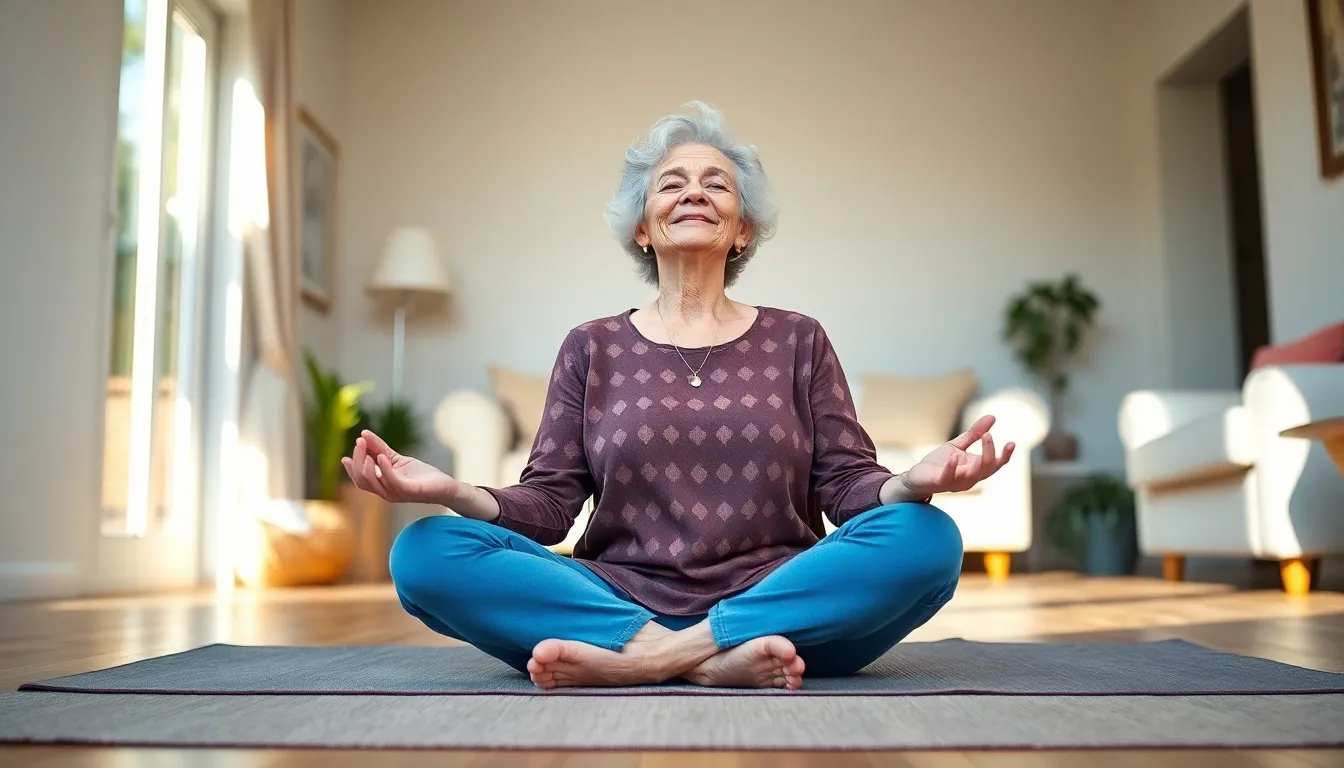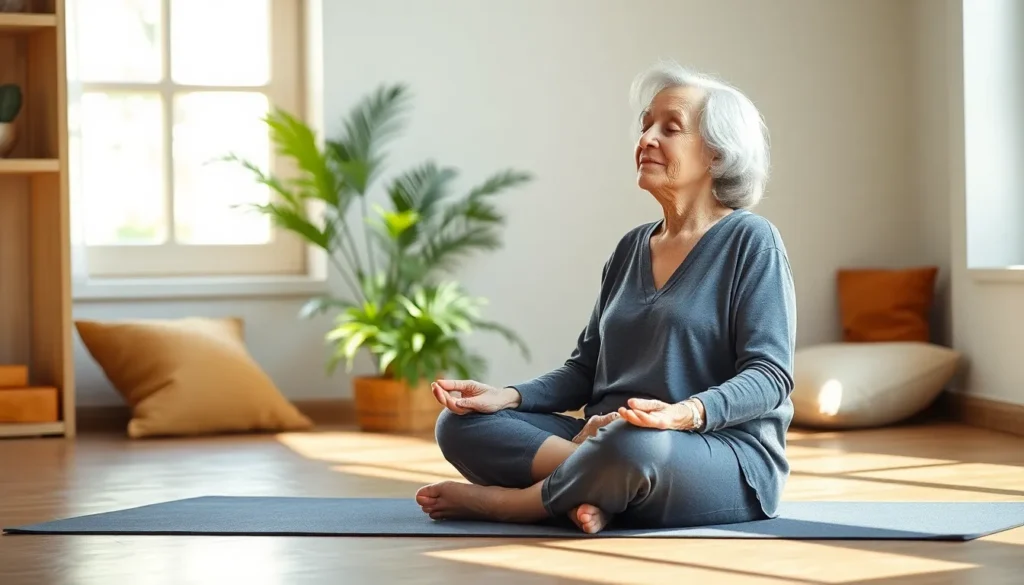Table of Contents
ToggleIn a world buzzing with distractions, seniors are discovering the power of mindfulness like a hidden treasure. Imagine trading in the chaos of daily life for a peaceful moment of clarity—sounds appealing, right? Mindfulness isn’t just for yoga enthusiasts or meditation gurus; it’s a practical tool that can enhance the golden years, helping seniors find calm amidst the storm.
Picture this: instead of worrying about that pesky grocery list or the latest episode of their favorite show, they can focus on the delightful aroma of fresh coffee or the joy of a loved one’s laughter. Mindfulness offers a chance to embrace the present, making every moment count. So grab a comfy chair, take a deep breath, and let’s explore how this ancient practice can add a sprinkle of serenity to life’s later chapters.
Understanding Mindfulness for Seniors
Mindfulness offers seniors a way to concentrate on the present amid life’s distractions. This practice fosters awareness of thoughts and feelings, enhancing overall well-being.
What Is Mindfulness?
Mindfulness refers to the practice of focusing attention on the present moment. Engaging with thoughts and emotions without judgment characterizes this approach. Techniques often include meditation, breathing exercises, and gentle movement. Many seniors find that these methods reduce anxiety and improve clarity. Incorporating mindfulness into daily routines can create a stronger connection to the present.
Benefits of Mindfulness for Seniors
Mindfulness provides numerous benefits specifically for seniors. It can reduce stress and promote relaxation. Many studies highlight its effectiveness in improving mental clarity and emotional resilience. Additionally, deeper appreciation for life’s simple pleasures often results from adopting mindfulness practices. Engaging with loved ones and savoring moments lead to enhanced social connections and overall happiness. Regular practice may also improve cognitive function, supporting memory retention and focus.
Techniques for Practicing Mindfulness

Mindfulness techniques provide seniors with effective ways to cultivate awareness and embrace the present moment. Practicing mindfulness contributes to their overall well-being.
Meditation Practices
Seniors can benefit from simple meditation practices that fit into their daily routines. Guided meditation sessions often focus on themes like gratitude and relaxation, helping seniors concentrate on positive thoughts. Another option includes mindfulness meditation, where individuals observe their thoughts without judgment. It’s essential to find a quiet space and use comfortable seating, allowing a sense of ease during practice. Participants may also choose meditation apps with specific durations to suit their schedules. Incorporating short sessions a few times a week can lead to significant improvements in mood and mental clarity.
Breathing Exercises
Breathing exercises serve as quick, effective tools for fostering mindfulness among seniors. Deep belly breathing encourages relaxation by shifting focus to the breath’s rhythm. Practitioners can start by inhaling deeply through the nose, letting the abdomen expand, then exhaling slowly through the mouth. Repeating this technique several times helps ground individuals in the present. Additionally, seniors can try the 4-7-8 method, which involves inhaling for four seconds, holding the breath for seven seconds, and exhaling for eight seconds. Regular practice of these breathing exercises can reduce stress levels and enhance focus, promoting tranquility and mental clarity.
Mindfulness in Daily Life
Mindfulness can integrate seamlessly into daily routines for seniors, enhancing overall well-being.
Incorporating Mindfulness into Routine
Incorporating mindfulness into daily activities can take various forms. Seniors may choose to allocate five to ten minutes each day for meditation or breathing exercises. Morning rituals, like mindful stretching or savoring a cup of tea, offer excellent opportunities to focus on the present moment. Walking can transform into a mindful practice by observing surroundings, such as the colors of flowers or the sounds of birds. Journaling also provides a means to reflect on thoughts and feelings, promoting awareness while enhancing cognitive function. Engaging family and friends in these practices can deepen connections and foster a supportive environment.
Mindful Eating and Living
Mindful eating encourages seniors to fully engage with their meals. Each bite becomes an opportunity to appreciate flavor, texture, and aroma, which enhances enjoyment. Setting aside distractions, such as phones or television, allows for focused attention on the meal. Chewing slowly promotes better digestion and a deeper connection with food. In addition to meals, mindful living encompasses the appreciation of daily acts, like taking a bath or enjoying nature. These moments can transform routine tasks into joyful experiences. By adopting a mindful approach, seniors cultivate a greater sense of gratitude, contributing to emotional resilience and overall happiness.
Challenges in Practicing Mindfulness
Seniors may face unique challenges when engaging with mindfulness practices. Understanding these barriers can help in finding effective solutions.
Common Barriers for Seniors
Physical limitations can hinder participation in certain mindfulness activities. Issues such as limited mobility or health conditions impact the ability to sit comfortably during meditation sessions. Cognitive changes may complicate the practice as well, making it challenging to focus on the present moment. Additionally, impatience can arise in some seniors, leading to frustration when results aren’t immediate. Lastly, external distractions, such as noisy environments, pose obstacles that disrupt mindfulness continuity.
Strategies to Overcome Challenges
Creating a comfortable environment is essential for successful mindfulness practice. Comfortable seating options, such as soft chairs or cushions, promote relaxation. Incorporating shorter sessions can also enhance focus, especially for those new to mindfulness. Utilizing guided meditation apps can provide support and structure, making the practice more accessible. Establishing a routine helps reinforce commitment, allowing seniors to integrate mindfulness into daily life. Finally, engaging in group sessions fosters community, facilitating motivation and shared experiences with peers.
Mindfulness offers seniors a powerful way to enrich their lives by embracing the present moment. By incorporating simple practices into daily routines they can experience reduced stress and improved emotional well-being. Engaging in mindfulness not only fosters a deeper appreciation for life’s simple pleasures but also strengthens social connections.
As seniors navigate the unique challenges of aging they can benefit from tailored mindfulness techniques that suit their needs. With consistent practice mindfulness can lead to significant improvements in mood and cognitive function. Embracing this journey can transform their later years into a time of peace and fulfillment.




